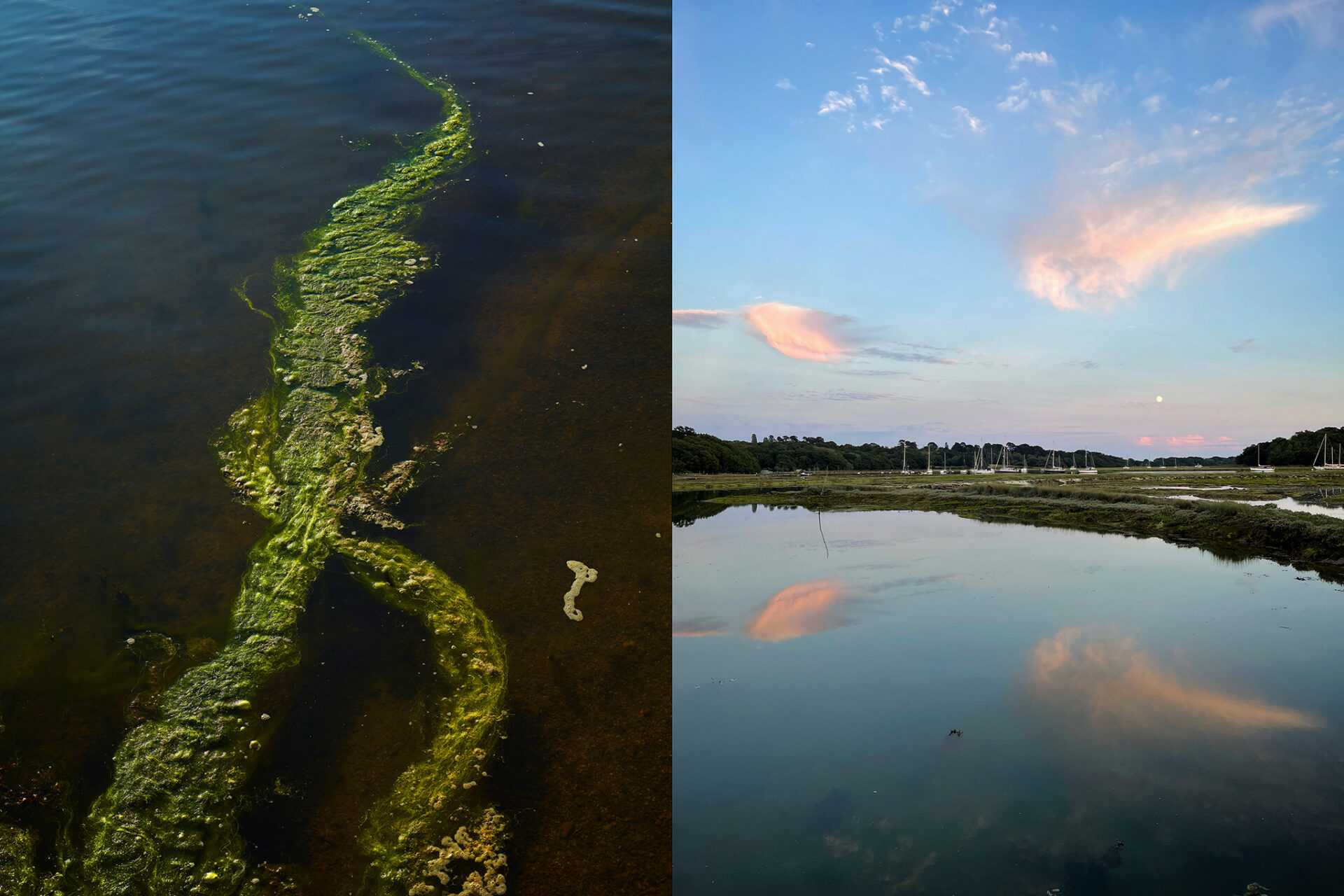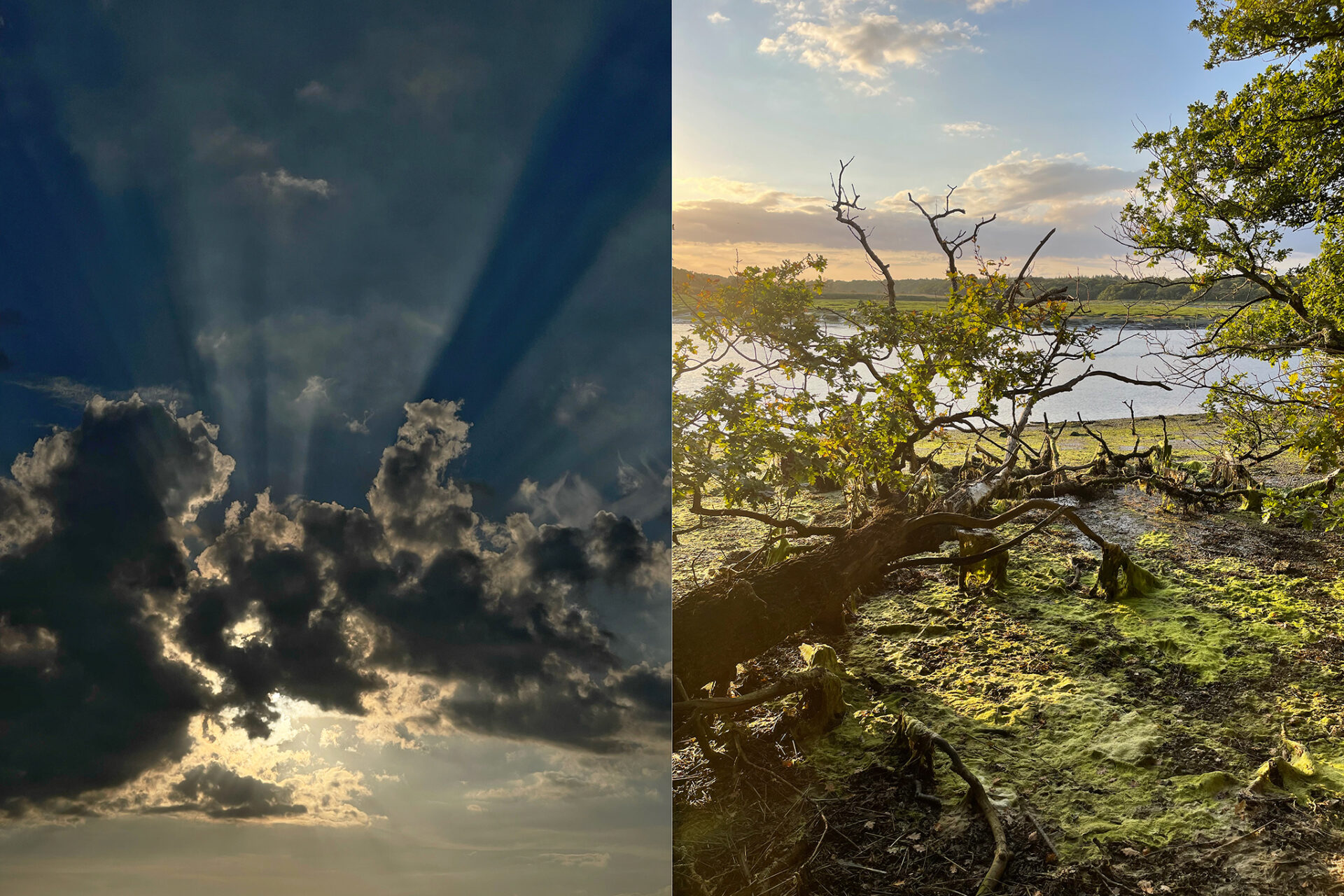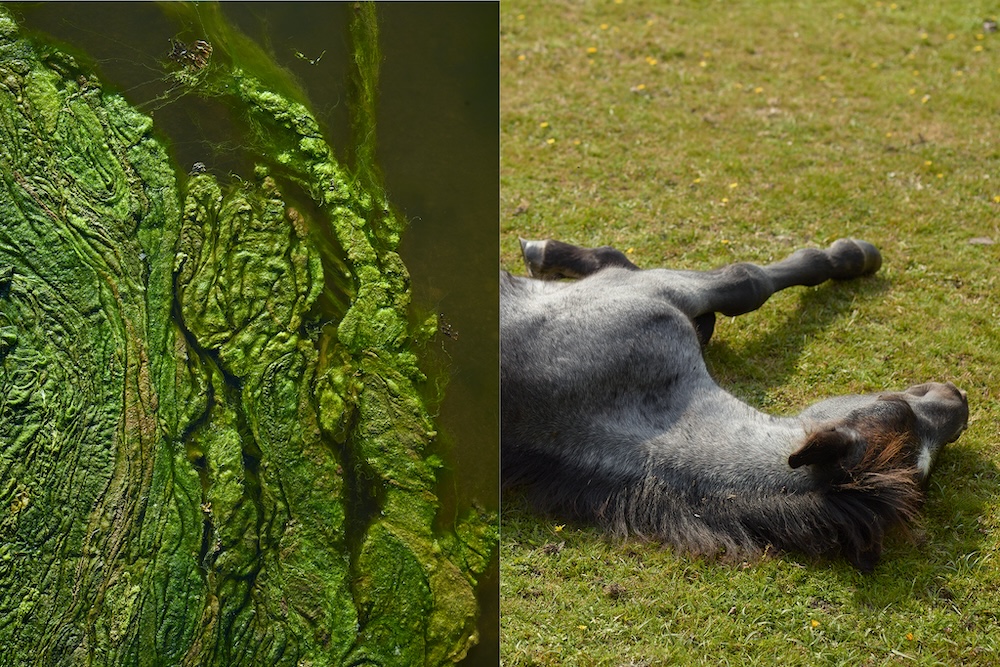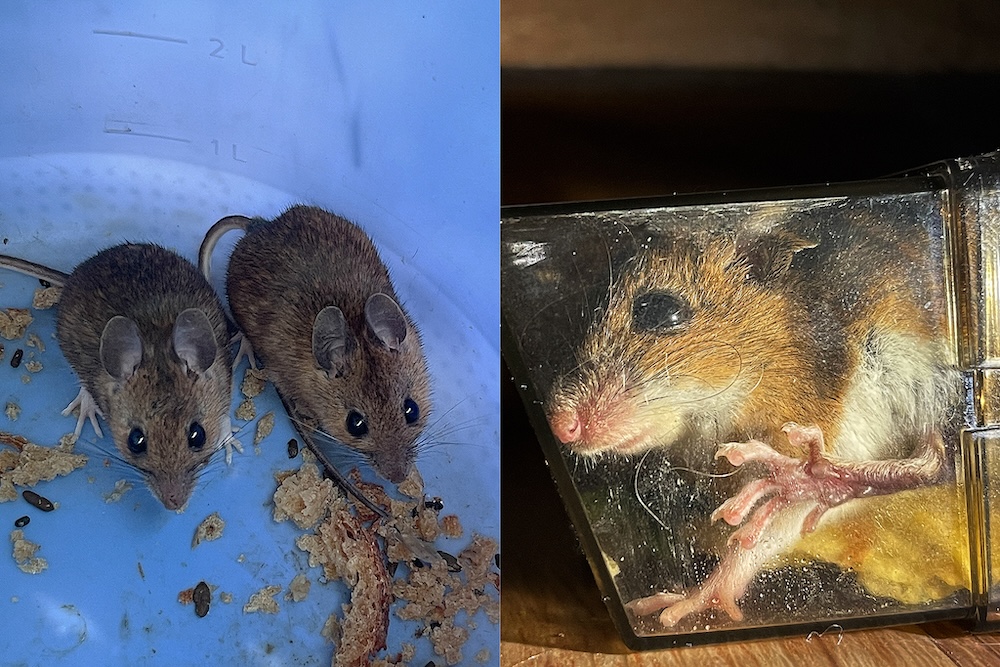Mark Mattock spends July and August lost in space.

“The silhouettes of their bond visible still at the last glow of the sun
they experience each other and the life of the night as it begins to stir
standing there in silence holding hands
no rush to go back inside
there is so much beauty and comfort in being in love and just being…
– amidst sounds of buzzing
chirps
crickets
the pleasant but irregular blowing of the wind
fireflies dancing in step with the light of the moon
how strange it is to become aware of another’s heartbeat but forget one’s own –
finally love.”
— Marcellus Williams, ‘At Last…Another’s Heartbeat.’
A cold morning. Patchinko 100 looks as if it’s fart-threading a string of little pearlescent scum bubbles behind it as I work it across the slicked and steaming surface. Zig zagging like a swimming snake, with occasional plops and dashes, mimicking an injured struggling fish. Longing now for that huge bow wave suddenly in its wake, suddenly looming behind it like an articulated truck menacingly tailgating a smart car in the middle lane. Craving the massive rush of adrenaline, the ear-pounding anticipation of the violent explosion of water and the sudden power of ferocious resistance. To be once again momentarily, thrillingly, shockingly, hard, hot, live wired — reconnected — by a single tenth-of-a-millimetre thick length of taught braid and a wand of dramatically arching carbon, to another life — the rest of life; nature, instinct, deep time, the universe, in the form of a large furious bass. But no, yet again, the ‘patch’ stops working and the very familiar feel of it being clogged. I reel it in, skit it across the water like a panicked dabchick; swing it up to my left hand, tuck the rod handle under my arm and, once again, proceed to pluck the comets of brilliant green plug-hole-hair like gut weed from the trebles. Noting for the thousandth time the wet lure is alarmingly warm. And again the voices in my head: ‘June was the hottest ever recorded,’ ‘sea temperatures are through the roof.’ Is this why I’ve only managed the one single large bass so far this year? Which is rapidly becoming the proverbial ‘fish of a thousand casts?’ But it’s not a salmon. It’s July, I should have had a dozen highs by now, at least, by this time of the year. Yes I know ‘many go fishing all their lives without knowing that it is not fish they are after.’ But I do know. I also know I couldn’t be a salmon angler. I couldn’t keep styling the constant crushing disappointment and frustration with Thoreau’s transcendentalist reasoning.
Bass are warmer water species with obvious biological plasticity, cunningly adept at exploiting new potential, will even explore rivers well into fresh water. So what’s going on? The channels and bays teeming with life, as plentiful as ever. I’m seeing them, maybe not as many as usual, but enough. A clue maybe in what I saw a couple of days ago. I initially mistook a large bass for a lone mullet, I thought it was a mullet flashing on the mud to rid itself of whatever was bothering it, like most fish do, until I realised it was a bass tipping on its side to more efficiently hoover the invisible marine mud scuds up into its huge gape. Scoops of micro crustacea (there can be 100,000 per square meter in an environment as healthy as this) clearly, for this fish, preferable to snouting out crabs in the purslane margins or expending energy pursuing larger fish prey…or the occasional lure.
‘…increased temperatures will increase the rate of every chemical reaction of life. This will be as true for the pathogen as it will for the pea…A rise in temperature of oceanic water increases the reaction rates of microscopic plants and fish and disconnects their feeding pattern both with themselves and with the sun.’ — Diana Beresford-Kroeger biochemist, botanist. Something that stayed with me from lockdown reading.

Peggy and Polly Dishwasher (pied wagtails) are keenly giving it another go, despite it being late in the season and already having reared a pair of fledglings. A clutch of five eggs, precious little stone-specked pebbles filling a disheveled pre fab cup of dry anaemic grass stems, the odd Canada goose breast feather, crisp bits of wrack and plastic rope fibres, as I lift the loose slat at the end of the jetty to confirm my suspicions. This new nest replacing the damp, rancid, mite-infested mattress I removed just a few weeks ago. A community service.
Under the substantially larger jetty, over the main river side, huge vivid green rafts of gut weed are ruched around its wrack and winkle encrusted supports. From above the striated mats of lush greens look like satellite images of the Congo or Amazon. Slumberous movement, gently wafting tails of fat lazing mullet poking out from the shadow line of the frayed edge cast on the river bed as they siesta underneath. Along the exposed tidal shore massive green carpets and sheets spread out like a vision of some medieval fabric-dying enterprise, left to dry and fix in the sun. Like distant tropical forests: where they are mostly green the dried bleached patches look like encroaching deforestation. In the mostly straw-coloured dried out carpets the green like rejuvenation. The exposed bladderwrack beds like far off deciduous forests glowing autumn gold and copper.
Again palpable relief on finally encountering white admirals in the glades whilst en-essential-shopping-route to the not so local supermarket. Particularly so as I deliberately went looking for them yesterday, scarily seeing none. Some with well worn wings, so they’ve been reassuringly about for a while. Yesterday’s no-show a mystery. Is it to do with UV levels?
Moribund looking pony foals sprawled out all over the parched flat greens, dozing in the hot heat haze among the archipelagos of furze; tails flick at the incessant buzzing. Rasping agitated young starlings churn the browning turf around fetlocks, hooves, heels, in and out of mare-shade; rushing from pony to pony like a flock of giant flies. The horizon wobbling. Grayling butterflies slap-down on the glaring flint-and-dust pony paths of white milled stones and powdered earth, and vanish as if they dropped through the surface, so effective is their cryptic colouring. Only if the heavy black mascara eye spot remains peeping over the hind wing is there a chance of spotting them sitting close-winged with a side characteristically tilted in right angle worship of the sun.

You’re from another planet. One in the final stages of climate meltdown, urgently visiting a similar one, in a last ditch search for salvation. This time not making the mistake of a predecessor, who hid in plain view among that planet’s dominant, dangerous, egocentric and self destructive species, who are dragging ‘their’ own planet down the same path as yours. As yet not so far along. You’ve utilised your advanced mastery of nanotechnology to shape and hide yourself, this time, in the immensity of the rest of that planet’s immeasurably numerous invertebrate life forms; and oh my God, I’ve just spotted you! Tiny, tiny, alien space fairy, nano jet packer with your impossibly micro-human looking stick body hanging limp under your propulsion pack shaped thorax, ballasted by the swollen balloon femurs of your dangling back legs. As you delicately, gracefully hover, manoeuvre, with intricate precision control over the raspberry ripple ice cream flower heads of the tall hemp agrimony by the the skinned oak; until you’re momentarily knocked off balance by the turbulence of the — to you — giant wings of a parting silver washed fritillary. Your disproportionally large slick double visored space helmet with devilishly long antennae, tasting and feeling for intel. Probably on the solitary bees that you’re sharing the flower heads with, whose nests you will search out and into which you will lay your alien eggs, next to theirs, with your long incredibly pliable ovipositor sheathed in the disproportionately long micro-miniaturised fishing rod looking wand, extending from the end of your erect abdomen. It was the almost glowing tip of your ‘rod’ that caught my eye, which I thought was just flash pulsing gossamer. Your offspring will feed on the fat grubs of your unwitting host, and/or their stored pollen provisions. You’re one of the most incredible living things I’ve seen, all twelve parasitoid millimetres of you. You’re not just another Thomas Newton, not with a name like Gasteruption jaculator.
My cabin nemesis has pluralised — nemeses? They ransacked the blue bucket bin under the sink. I forgot to take away its contents when I left a couple of weeks ago, and I’m now greeted with the aftermath of some huge mouse-drop firework detonated in it. At the smeared bottom of a plastic olive oil bottle a furred gobbet of some putrid dark matter. I suddenly realise. How impossibly slippery it must have been inside.
A scorched earth stratagem applied each end-of-day to kitchen top, cooker and lino floor hasn’t been that successful, the little fuckers are relentless and fearless. Before retiring to bed I prepare the new deterrent I brought with me. Wedging an apple core into the end, gently setting the treadle and trap door, I place the humane trap on the floor tight to the cupboard skirting, a wood mouse rat run. Woken by a single plasticky click in the dark. Open eyes in silent expectation. Sudden burst of frantic scraping and the trap sounding as if it’s suddenly motorised. Blinded in the head torch glare, haunched pent in the cheap clear plastic trap, staring at me with total disdain and disgust, my long time adversary. I take them out into the warm night, the tawnys hooting and screeching. To the edge of the deck where I lift the trap door, allow the cabin burglar to slide down to the open end, pause, let whiskers twitch for bearings before they leap to freedom in the delusion that they won’t return for the rest of the night. An hour later, click, silence, scuffle, repeat. Three times more. The same the night after. And the night after that. So I start interning my captives in the blue bucket, leaving it out side with some food, replacing the heavy frying pan lid every time I drop a new captive in. Three per night average. I repeatedly fail to catch mouse three-thirty though (always turns up a 3.30am). Incredibly, he, she, manages somehow to escape with the apple core every time. How?
Two pink broccolis of cumulonimbus rising from the distant southern horizon, through a stratum of pastel sky: dirty cream, bleached peach to pallid blue. The sun remaining crouched behind the eastern oaks as I pick up the bucket of wood mice to take up the lane. The musket slips deadly across the path. Beyond, a roe pair bolt at my approach, the doe starting first into the conifer plantation, he panics that she’s getting away, accelerating to a reckless speed in pursuit. The looks from the little black pop-eyed delinquents, poised for prison break, at the bottom of the bucket, when I lift the pan, are to die for. I can only imagine the ultrasonic curses before they all leap out, clearing the rim, limbs akimbo, like little mouse-skin rugs. Even from here they’ll find their way back. It’s not working, I’m giving in. Laughing green woodpecker and chuckling nuthatch, cooing woodies and an ear-splitting wren as I walk back to the cabin which is creaking back to life in anticipation of another hot august day.

A peregrine materialises, as if birthed from the mud, opens up and rips across the marsh at a speed that is simply exhilarating to witness, my brain converting the awesome vision into tangible physically felt energy. Maybe made more so because it was an uninterrupted connection, I don’t have my binoculars. The text I got when pulling out of the station was a genuine bombshell; ‘you left your binoculars.’ It was panic, enough to want to abort the journey. But I didn’t. I’ve been going to lift them from my chest to my eyes repeatedly, it feels like some phantom limb thing, completely weird. I’ve never forgotten them before, they literally are a part of me when out in the land. The peregrine moment was a lesson, something about tunnel vision.
Chirping crickets soothing. Moonless night, sharp crystal black sky of stars, of unfathomable enormity. Caressed by the warm night air like a nuzzling womb. Plops and trickles of water beasts unseen, larger now in the dark; the tawny owls enormous, still soft. I feel the hawking bat, out there and near, sonically feeling its ultrasonic echos returned in nano seconds from the thin braid vibrated by the seductive komomo lure wobbling just beneath the black mirror surface that I’m gently reeling back to me. All is feel, ear to fingertip. I feel something asking me to turn, back to the cabin I can’t see, under the oaks I also only feel, and when I do the shock wave from the tiny isotope of the brightest intense green glowing from the grass bank, of the small promontory, overwhelms like lightening, in an instant. Shocking in its smallness, in its immense presence. Something immensely precious, otherworldly, has fallen to earth and is signalling back to the stars above desperately for rescue: distress signals, pleading come and get me, don’t leave me. A dying ember. A tiny alien life lost, abandoned, forgotten. Crawled from the life-stifling glare of artificial light to a dark place of safety to send its mayday. She is there the following night; the lone female glow worm desperately calling for a mate as if she is the last of her kind. Glowing like the tiny fragile earth in the abyss in photos taken from NASA space probes. I want it to be a sign, of hope, a tiny glimmer of light at the end of the tunnel that is this the darkest year; of diminishing souls, of so few butterflies. I’m trying.
The first cold electric jolt of freezing dew on my bare feet only just precedes the distant blast of a shotgun that sets off a frantic piercing outburst from an oystercatcher. The bounce-arse sandpiper just carries on picking around the crab warrens, under the slowly dismantling jetty, before they disappear under the encroaching water upon which the biggest bubbles of scum sit, spawned as each burrow drowns. Some so big a wood mouse could fit in. Another glorious dawn.
A peep from behind, I turn to the sudden arrival of the kingfisher, on the length of handrail still remaining on the collapsing footbridge. So close. Spotlit in morning bright. Deep blue wings, electric blue rump, raw russet red breast, white as white sideburns behind marble eyes set under a heavy brow — the rim of its greased back crown making it look some flamboyant flat-capped poacher. Huge dagger bill raised slightly up, staring at me arrogantly whilst restlessly head bobbing, which syncs with a strange stunted tail flex, moving like some emerging larva, or as if the bird is constipated. As it departs and jets across the water sprays of fry explode under it in sequence. A gust of swallows and house martins blows in from the north, from over the oaks. They stay most of the day, ‘insecting’ all along the oak boundary, fattening up, fuelling, preparing for the long journey home.
The purple hairstreak is still criss-crossing the star-shaped opening in the oaks directly above the deck as the light fades, the topmost leaves flaming in the last rays. Sitting alone in the vastitude of the new night, the first laughing, cheering and jeering of party night at the pub twinkling in the distance. No one knows I’m here. For a short while, immense peace.
*
Footnote: Marcellus Khaliffah Williams was executed by the state of Missouri on the 24th of September 2024 for a crime that all concerned came to conclude he was innocent of and for whom all fought for at the very least a commuted sentence.
Mark Mattock. Artist. Photographer. Publisher. Rabbit Fighter. @the_rabbit_fighters_club